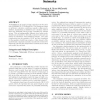Free Online Productivity Tools
i2Speak
i2Symbol
i2OCR
iTex2Img
iWeb2Print
iWeb2Shot
i2Type
iPdf2Split
iPdf2Merge
i2Bopomofo
i2Arabic
i2Style
i2Image
i2PDF
iLatex2Rtf
Sci2ools
114
click to vote
PEWASUN
2004
ACM
2004
ACM
An M/MMGI/1/K queuing model for IEEE 802.11 ad hoc networks
An M/MMGI/1/K queuing model is developed for the analysis of IEEE 802.11 DCF using RTS/CTS. Results are based on arbitrary contention conditions, namely, collision probabilities, transmission probabilities and contention window sizes vary arbitrarily among nodes contending for channel access. This is fundamentally different from earlier work. Results are presented for the fully-connected case and validated via simulation with statistical analysis. The main contributions are the analysis of DCF and the foundation for the analysis of multi-hop scenarios. A key element of the model is that complexity normally encountered is reduced by effectively restoring the independence between service times and packet inter-arrivals. Categories and Subject Descriptors C.2.1 [Comm. Networks]: [Wireless communication] General Terms Performance, Theory
Arbitrary Contention Conditions | Ieee 802.11 Dcf | M/MMGI/1/K Queuing Model | PEWASUN 2004 | Wireless Networks |
Related Content
| Added | 30 Jun 2010 |
| Updated | 30 Jun 2010 |
| Type | Conference |
| Year | 2004 |
| Where | pewasun |
| Authors | Mustafa Özdemir, A. Bruce McDonald |
Comments (0)

